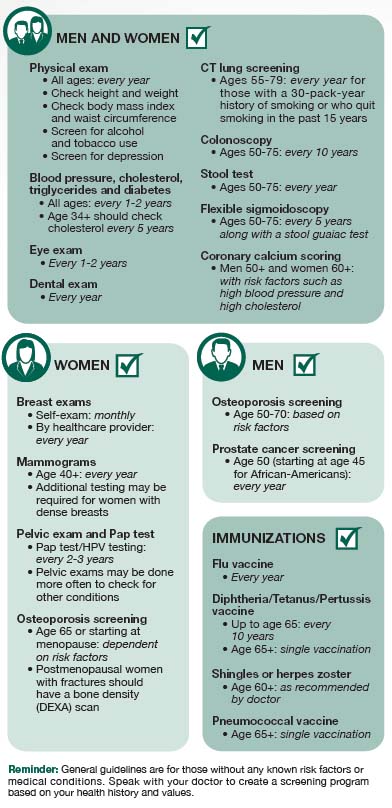March 27, 2020 by John Fernandez
Don’t Put Off Regular Screenings

 The message about staying healthy is clear: Eat right, exercise, make healthy lifestyle choices and routinely visit the doctor.
The message about staying healthy is clear: Eat right, exercise, make healthy lifestyle choices and routinely visit the doctor.
Regularly scheduled checkups, complete with different screening exams tailored toward your age, keep you on the wellness track.
“Many people put off going to a doctor when they are healthy and do not want to be screened for diseases when they feel fine, but this helps maintain a healthy lifestyle,” said Lawrence Elgarresta, M.D., Baptist Health Diagnostic Imaging medical director. “Routine screenings are important because we can often catch and treat medical issues early, before they become major problems.”
For adult men and women, the screenings include:
- Blood pressure: every 1-2 years
- Eye exam: every 1-2 years
- Cholesterol: over age 34 every 5 years or beginning age 20 or earlier for those with cardiac risk factors
- CT lung screening: ages 55-79 every year for those with a 30-pack-year history of smoking or who quit smoking in the past 15 years
- Colonscopy: ages 50-75 every 10 years or if not available, sigmoidoscopy or CT colonography every 5 years in addition to fecal blood testing every 3 years
- Coronary calcium scoring for men over 50 and woman over 60 with cardiac risk factors such as high blood pressure or high cholesterol
For adult men, the screenings should also include:
- Osteoporosis screening: ages 50-70 based on risk factors
- Prostate cancer screening: beginning with age 50 every year (beginning age 40 for African-Americans every year)
For adult women, the screenings should also include:
- Breast exams: every year
- Mammograms: beginning age 40 every year
- Pelvic exam and pap test: every 2-3 years or more often depending on medical history and risk factors
- Osteoporosis screening: beginning at age 65 or starting at menopause depending on risk factors
These screenings are guidelines but you should check with your doctor about your specific diagnostic needs.
“We want our patients to pay attention to their bodies and their health at each stage of life,” Dr. Elgarresta said. “Routine screenings help us do that.”
(Click on graphic above to enlarge.)
top stories












There are no comments